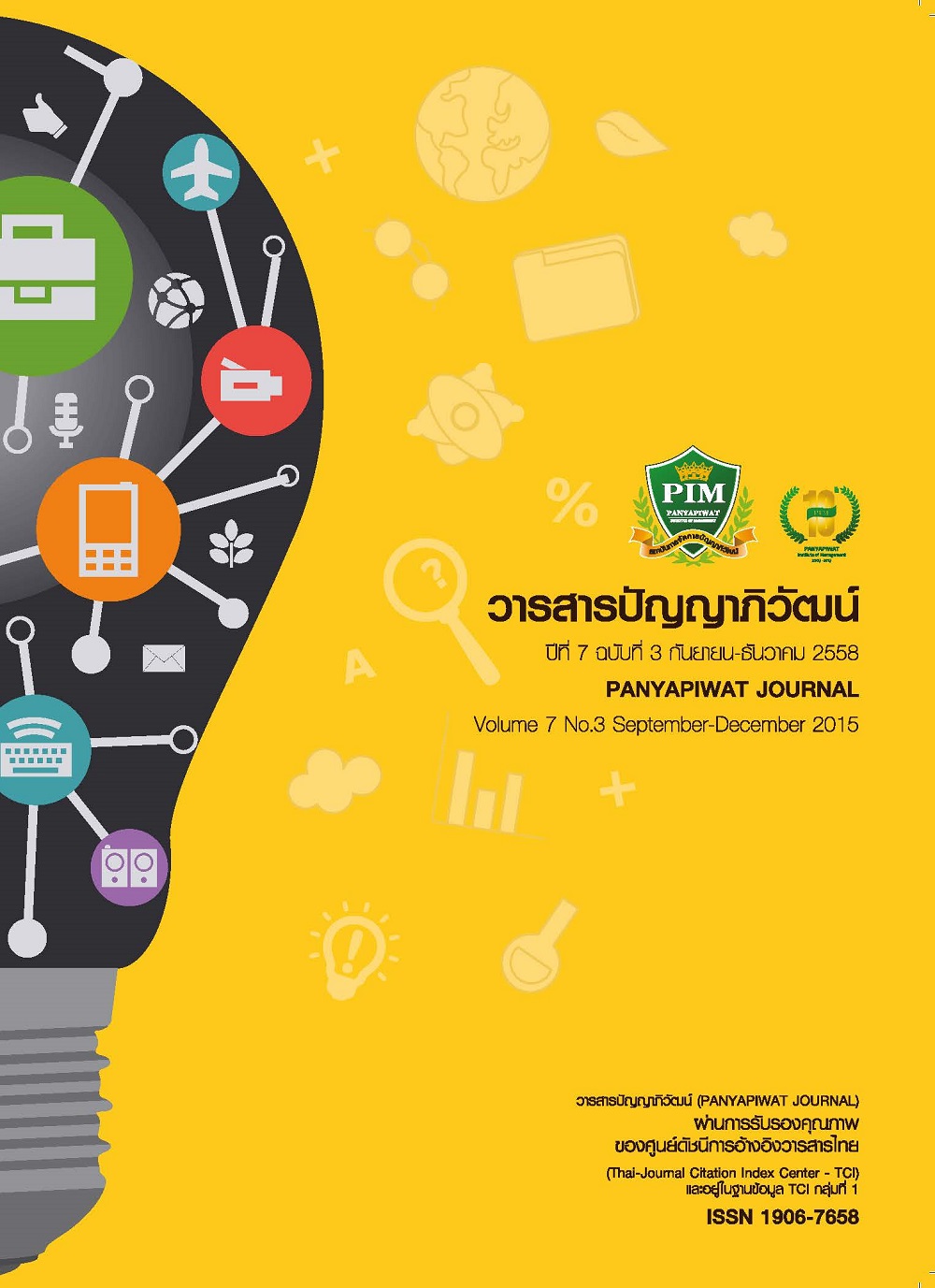LEADERSHIP AND CORPORATE SUSTAINABILITY: A CASE STUDY OF THAI SMEs
Main Article Content
บทคัดย่อ
The purpose of this research is to study the relationship of sustainable practices and leaderships towards corporate sustainability of Thai Small and Medium Enterprises (SMEs). Leaders are top management who create policies and make decisions for their organizations. Chief Executive Officers (CEOs) of listed companies in stock markets have continuously implemented international best practices in order to comply with the international Standards for sustainability such as the Dow Jones Sustainable Index (DJSI). In Thailand, it is seen that there is lack of research material covering the relationship between Sustainable Practices and Leadership in the context of Sustainability of Thai SMEs. The questionnaires were collected from 406 entrepreneurs and executives. This quantitative research uses statistical analysis by Pearson’s Correlation, Spearman’s Correlation and OLS Regression model. The results show that Sustainable Practices and Leaderships are all significant to economic, environmental and social dimensions under corporate sustainability. In addition, entrepreneurs and executives in Thai SMEs should put emphasis on environmental and social dimension of sustainability in managing their organizations.
การวิจัยนี้มีวัตถุประสงค์เพื่อศึกษาภาวะผู้นำและการพัฒนาอย่างยั่งยืนในวิสาหกิจขนาดกลางและขนาดย่อมในประเทศไทย ผู้นำมีความสำคัญที่สามารถกำหนดนโยบาย จุดมุ่งหมาย และการตัดสินใจต่างๆ ในบริษัท ซึ่งปัจจุบันผู้นำในบริษัทขนาดใหญ่ได้หันมาพัฒนาองค์กรให้เกิดความยั่งยืนโดยมีตัวชี้วัดสากล เช่น Dow Jones Sustainable Index (DJSI) อย่างไรก็ตามฟันเฟืองในการสร้างความได้เปรียบของประเทศก็ขึ้นอยู่กับธุรกิจขนาดเล็กและกลางเช่นกัน ในการวิจัยนี้จะหาปัจจัยที่ส่งผลต่อการพัฒนาอย่างยั่งยืนใน SMEs โดยแจกแบบสอบถามให้กับผู้บริหารและเจ้าของธุรกิจ ซึ่งมีกลุ่มประชากรจำนวน 406 บริษัท การวิจัยเชิงปริมาณนี้ได้ใช้เครื่องมือทางสถิติในการวิเคราะห์ผล ได้แก่ สหสัมพันธ์แบบเพีนร์สันและสเปียร์แมน และการวิเคราะห์การถดถอยแบบ OLS จากการสำรวจพบว่า ปัจจัยทั้งหมดในด้านการปฏิบัติและภาวะผู้นำมีผลต่อความยั่งยืนในองค์กร อย่างไรก็ตามผู้นำในธุรกิจขนาดกลางและเล็กควรให้ความสำคัญกับการรายงานผลเกี่ยวกับสิ่งแวดล้อมและสังคมมากขึ้น
Article Details
“ข้าพเจ้าและผู้เขียนร่วม (ถ้ามี) ขอรับรองว่า บทความที่เสนอมานี้ยังไม่เคยได้รับการตีพิมพ์และไม่ได้อยู่ระหว่างกระบวนการพิจารณาลงตีพิมพ์ในวารสารหรือแหล่งเผยแพร่อื่นใด ข้าพเจ้าและผู้เขียนร่วมยอมรับหลักเกณฑ์การพิจารณาต้นฉบับ ทั้งยินยอมให้กองบรรณาธิการมีสิทธิ์พิจารณาและตรวจแก้ต้นฉบับได้ตามที่เห็นสมควร พร้อมนี้ขอมอบลิขสิทธิ์บทความที่ได้รับการตีพิมพ์ให้แก่สถาบันการจัดการปัญญาภิวัฒน์หากมีการฟ้องร้องเรื่องการละเมิดลิขสิทธิ์เกี่ยวกับภาพ กราฟ ข้อความส่วนใดส่วนหนึ่งและ/หรือข้อคิดเห็นที่ปรากฏในบทความข้าพเจ้าและผู้เขียนร่วมยินยอมรับผิดชอบแต่เพียงฝ่ายเดียว”
เอกสารอ้างอิง
Avery, G. & Harald, B. (2011). How BMW successfully practices sustainable leadership principles. Strategy & Leadership, 39(6), 11-18.
Avery, G. & Harald, B. (2011). Sustainable leadership practices for enhancing business.resilience and performance. Strategy & Leadership, 39(3), 5-15.
Avery, G. (2005). Leadership for Sustainable Futures: Achieving Success in a Competitive World. Cheltenham: Edward Elgar.
Chaipat, P. & Watsaya, L. (2005). Financial Access of SMEs in Thailand: What are the roles of the central bank?. Monetary Policy Group, Bank of Thailand.
Clandia, M., Jordana, M., Isak, K., Luciana, A. & Roberto, S. (2015). Management for sustainability: An analysis of the key practices according to the business size. Ecological Indicators, 52,116-127.
Dato, H. (2015). SME development framework: The Malaysia case, Cairo AMC-CBE-WBG SME Conference, 14-15 January 2015.
Fernandez, J., Xu, B., Zhou, D., Puyuelo, M. & Li, J. (2013). Business in China Survey, CEIBS.
Gitsham, M. (2012). Experiential learning for leadership and sustainability at IBM and HSBC. Journal of Management Development, 31(3), 298-307.
Ivo, K. (2001). Dow Jones Sustainability Group Index: A Global Benchmark for Corporat. Sustainability. Corporate Environmental Strategy, 8(1), 6-15.
Kantabutra, S. & Avery, G. (2011). Sustainable leadership at Siam Cement Group. Journal of Business Strategy, 32, 32-41.
Kantabutra, S. (2014), Measuring corporate sustainability: a Thai approach. Measuring Business Excellence, 18(2), 73-88.
Knoepfel, I. (2001). Dow Jones Sustainability Group Index: A Global Bench mark for corporate sustainability. Corporate Environment Strategy, 8(1), 6-15.
Middlebrooks, A., Miltenberger, L., Tweedy, J., Newman, G. & Follman, J. (2009). Developing a sustainability ethic in leaders. Journal of Leadership Studies, 3, 31-43.
Ministry of Commerce. (2015). ข่าวกระทรวงการคลัง.กลุ่มสารนิเทศ สนักปลัดกระทรวงการคลัง. Vol. 72/2015.
Nazir, S., Qun, W., Syladeth, S. & Hossain, E. (2014). Leadership for Sustainable Future Development.
International Journal of Business, Economics and Management Works, 1(2), 24-29.
OSMEP. (2007). Report on 2006 Small and Medium Enterprises Situation and Outlook for 2007, Bangkok
OSMEP. (2014). Executive Summary: White paper on SMEs 2014. The Office of SMEs Promotion.
Pamela, S. (2011). Sustainability Leader Competencies: A Grounded Theory Study. Agricultural Leadership, Education & Communication Department, University of Nebraska - Lincoln.
Patricia, H., Andrew, W. & Gilbert, L. (2009). Developing leaders for sustainable business. Corporate Governance: The international journal of business in society, 9(1), 7-20.
Piboolsravut, P. (2004). Sufficiency Economy. ASEAN Economic Bulletin, 21(1), 127-134.
Puntasen, A., Premchuen, S. & Keitdejpunya, P. (2003). Application of the Royal Thought about the Sufficiency Economy in SMEs. Bangkok: Thailand Research Fund.
Rene, A., Bert, B., Tracey, B. & Woody, W. (2013). Effective Leadership for Sustainable. Development. Journal of Organizational Learning and Leadership, 11(1), 29-36.
Robbins, S. P., Decenzo, D. A. & Coulter, M. (2013). Fundamentals of management. (9th ed.).New Jersey: Pearson Education.
RobecoSAM. (2015). Corporate Sustainability Assessment Companion. Retrieved November 11,2015, from http://www.sustainability-indices.com/images/RobecoSAM-Corporate-Sustainability Assessment-Companion.pdf
Sirimongkhon, V. (2008). Laws and ISO 26000 social responsibility: case study of businesses in Thailand. Chulalongkorn University.
Terdsak, R. (2015). SMEs High-Growth in Thailand. Advances in Social Research Journal, 3(1),209-217.
Tore, M. (2012). Sustainability as corporate mission and strategy. European Business Review, 24(6),496-509.
Victoria, L., Arminda, G. & Lazaro, R. (2007). Sustainable Development and Corporate Performance: A Study Based on the Dow Jones Sustainability Index. Journal of Business Ethics, 75, 285-300.
Waite, A, M. (2013). Leadership's influence on innovation and sustainability. European Journal of Training and Development, 38(1/2), 15-39.
World Commission on Environment and Development-WCED. (1987). Our Common Future. Oxford University Press.
Yamane, T. (1967). Statistics: An Introductory Analysis. New York: Harper and Row.


